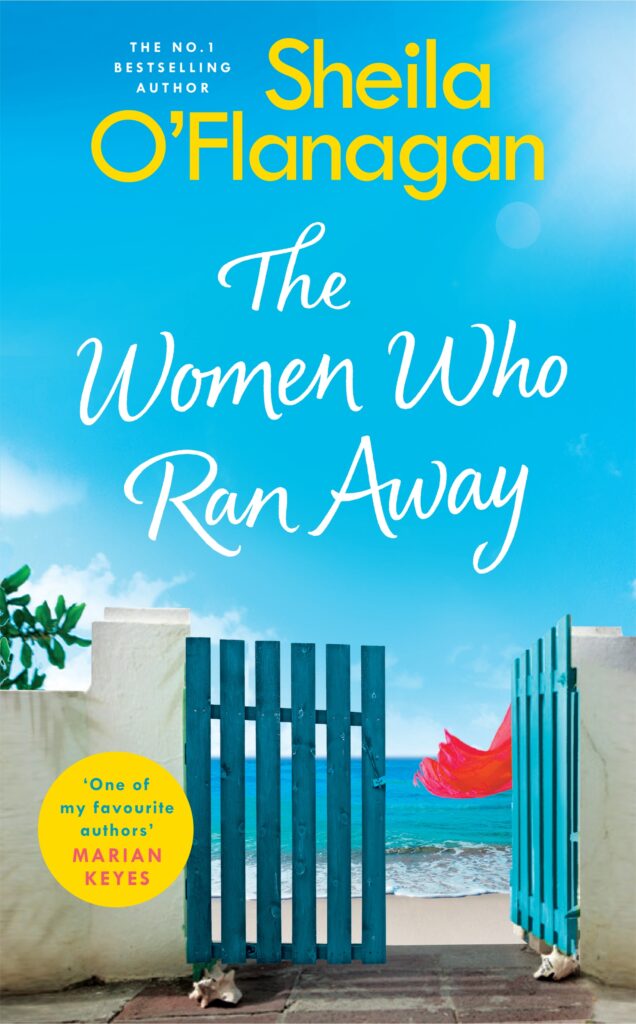The Women Who Ran Away by Sheila O’Flanagan is published 16th July 2020 (Headline Review, £18.99).
 I’ve always loved reading and used to write sequels to Enid Blyton stories when I was young because I always wanted to know what happened next. Everyone thought I’d end up, if not a novelist, at least working in a library or a bookshop. However I was offered job in a bank and got side-tracked into the world of finance. I occasionally wrote short stories in the evenings as a way of unwinding but I didn’t think I had the time to write a novel, even though I had lots of different ideas and would think about my various characters whenever I wasn’t working. Eventually I realised that if I wanted to fulfil my dream of being a published author I’d have to make the time to write – unfortunately the ideas don’t magically appear on the page. So I bought myself a laptop, opened a Word document, typed Chapter 1 and wrote every evening until it was finished. I’ve kept going ever since.
I’ve always loved reading and used to write sequels to Enid Blyton stories when I was young because I always wanted to know what happened next. Everyone thought I’d end up, if not a novelist, at least working in a library or a bookshop. However I was offered job in a bank and got side-tracked into the world of finance. I occasionally wrote short stories in the evenings as a way of unwinding but I didn’t think I had the time to write a novel, even though I had lots of different ideas and would think about my various characters whenever I wasn’t working. Eventually I realised that if I wanted to fulfil my dream of being a published author I’d have to make the time to write – unfortunately the ideas don’t magically appear on the page. So I bought myself a laptop, opened a Word document, typed Chapter 1 and wrote every evening until it was finished. I’ve kept going ever since.
2. What you have written, past and present.
My first novel, Dreaming of a Stranger, was published in 1997. I’ve written 25 novels for adults, 3 collections of short stories, 2 children’s books and contributed to both the Quick Reads and Open Door series of short novellas.
3. What you are promoting now.
My latest book is The Women Who Ran Away and is about two women, Grace and Deira, who meet on a car ferry from Ireland to France. Both have reasons for travelling alone but a sudden change of circumstance mean that they end up driving together. As a friendship forms between them, Deira helps Grace try to solve a complicated mystery that her late husband has left her. This takes them on a spectacular journey along the French Atlantic coast and through the heart of Spain to Cartagena on the Mediterranean sea. By the end of the novel they’ve completed both a physical and an emotional journey as they discover that sharing their secrets turns out to be a strength and not a weakness, and that there’s always more than one solution to a problem.
4. A bit about your process of writing.
I try to write every day but that’s not always possible. I generally work for a couple of hours in the morning, then take a break and return for some more writing in the afternoon. I move backwards and forwards through the novel, writing a few chapters and then editing them before moving on.
5. Do you plan or just write?
I wish I was an author who planned! But I can’t. I start at the beginning with a vague idea and just hope for the best.
6. What about word count?
I don’t get hung up on a daily word count, especially at the start of the novel, but I try to write in scenes. If I finish a scene I’ll take a break before moving to the next one. That means sometimes writing a few hundred words, sometimes significantly more.
7. How do you do your structure?
Badly, to be honest. But the process of writing, then editing, writing, then editing helps. I usually come up with a slightly more formal plan about a third of the way through the novel when I have a better idea of the characters and how to move them through the story.
8. What do you find hard about writing?
Sitting at the laptop. It’s physically demanding even though you don’t realise it. Most of my author friends have bad backs and I’m no exception. I try to take more mini-breaks now. Distractions are more of a problem these days than they used to be with social media getting in the way. I’m more easily distracted now than before.
9. What do you love about writing?
Creating characters, seeing them grow and evolve and take control of their own stories. Sometimes the research is good too!
10. Advice for other writers?
Don’t get hung up on trying to write for a genre, or following weird rules about how your book should be structured. Write the story that’s inside you in the way that suits you best. Do remember, though, that while joining various groups about writing and following them on social media can make you feel less alone, the only thing that will get your book written is sitting down and writing it. Talking about writing isn’t actually writing. Reading about writing isn’t writing. The only person who can write your book is you.
Sheila is @sheilaoflanagan on Twitter and follow Headline too @headlinepg

